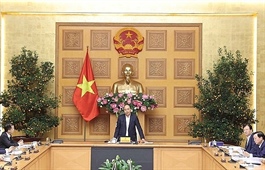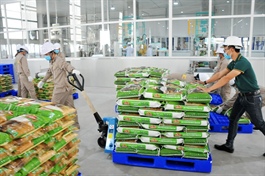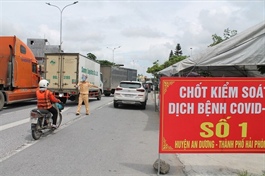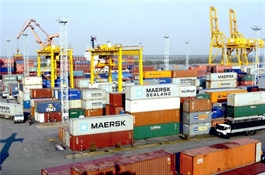Vietnam to realize 6.5% growth target: PM
Vietnam to realize 6.5% growth target: PM
It is vital for Vietnam to further boost the development of private sector and public investment funds, in turn contributing to economic growth and creating the foundation for long-term development.
Vietnam would speed up socio-economic recovery to realize the growth target of 6.5% for this year.
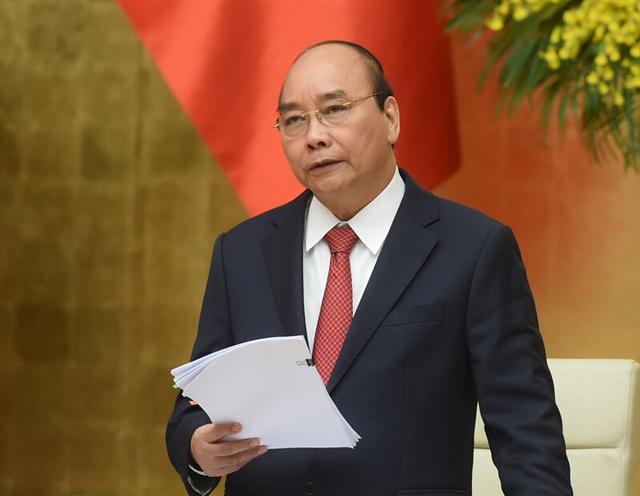
Prime Minister Nguyen Xuan Phuc at the meeting. Photo: Quang Hieu
|
Prime Minister Nguyen Xuan Phuc stressed the view at a monthly government meeting on March 2, which were attended by government leaders and representatives of ministries and sectors.
Among measures to boost growth, the PM stressed the importance of enhancing greater efficiency in global integration to boost exports and attract high quality foreign direct investment (FDI).
“The current situation presents huge opportunity for Vietnam to attract investment capital,” stressed Phuc, adding a favorable investment environment is a must to keep capital inflow from growing.
In addition to the role of state-owned corporations, Phuc said it is vital for Vietnam to further boost the development of private sector and public investment funds, in turn contributing to economic growth and creating the foundation for long-term development.
According to Phuc, disbursement of public funds is a major mission, for which the Government Office is tasked with inspecting efficiency in disbursing public funds and ODA-funded projects.
Phuc stressed the importance of reviewing current supporting programs and proposing new ones to assist businesses and people affected by the pandemic.
“Nurturing economic growth drivers and creating long-term revenue sources are the objective for monetary and fiscal policies,” said Phuc.
The PM requested major economic hubs to play a greater role in aiding economic growth, especially Hanoi, Ho Chi Minh City, Vung Tau, Danang, and Can Tho.
For economic sectors that are struggling with the Covid-19 impacts, including those in fields of aviation, services, and tourism, Phuc called for substantial measures to address their concern and difficulties.
Expansionary fiscal, monetary policies to boost growth
At the meeting, Minister of Planning and Investment Nguyen Chi Dung said Vietnam remains steadfast in pursuing expansionary fiscal and monetary policies to boost economic growth and control inflation rate.
Dung referred to a forecast that the Covid-19 pandemic would continue to exert its impacts on the global economy until at least the first half of 2021 or when Covid-19 vaccines are rolled out worldwide, as such, “keeping expansionary fiscal and monetary policies are necessary,” he added.
“It is important to enhance efficiency in the combination of fiscal and monetary policies to aid economic recovery and keep inflation under control,” Dung asserted.
“Government agencies and provinces/cities should closely monitor the market situation to timely propose supporting policies for people and businesses affected by the pandemic, especially for those operating in services, tourism and transportation sectors,” stressed Dung.
Meanwhile, the minister urged to stay alert against the Covid-19 pandemic as the country aims to ensure the realization of the dual target of both containing the pandemic and boosting economic recovery.
Amid the Covid-19 outbreak, Dung requested related agencies to soon issue a uniform safety procedure during the production and distribution of farm produce from Covid-19 zones to other localities.
While the world is still struggling with the Covid-19 impacts, “the domestic market remains a priority,” asserted Dung.
Dung also highlighted the importance of applying hi-tech and accelerating the digital transformation process and promoting e-commerce, in which local authorities should provide more support for enterprises to shift their operation online and apply e-payment methods.
“Vietnam would step up efforts in diversifying trade markets depending on the actual Covid-19 situation globally, while taking this opportunity to restructure the country’s export-import activities to reduce its reliance on a single market,” noted Dung.
With foreign direct investment (FDI) as a key source for economic growth, Dung called for a more selective approach in attracting such capital inflow, including a thoroughly review of M&A activities related to enterprises operating in national core and strategic business fields with high socio-economic impacts.
“The move is necessary to ensure favorable conditions for FDI attraction, protect domestic enterprises and prevent tax evasion through investment activities,” Dung concluded.







